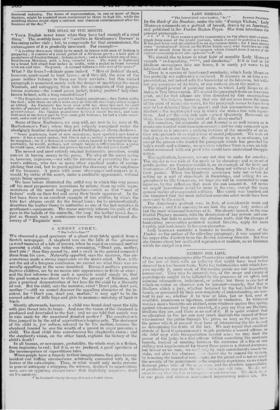A GHOST STORY.
" Fee !—fa !"
WE observed a good specimen of a ghost story lately quoted from a Scotch newspaper. A shepherd was on the hills at the gloaming (a word ominous of a tale of terror), when he espied an enraged mother pursuing a child, who ran before, screaming, " Don't you, mother, don't you:' thus they passed by, and a swell in the ground concealed them from his view. Naturally appalled, says the narrator, this cir- cumstance made a strong impression on the man's mind. Now, with- out the aid of a foregone conclusion, we cannot see what there was na- turally appalling in the scene described. Enraged mothers pursuing fugitive children, are by no means rare appearances in fields or cities ; and the first inference from such a spectacle would simply be, that the good woman was about to observe the precept of Solomon, and give a practical demonstration of her love for the child by it liberality of rod. But the child, says the narrator, cried " Don't you, don't you, mother we cannot discover the appalling character of the in- cident, for " Don't you, don't you, mother," is very apt* to be the earnest advice of little boys and girls to mammas minatory of hand or birch.
Shortly afterwards, however, a child was found dead upon the hills
with pins thrust into its brain. And now the vision of the shepherd is produced and dovetailed to the fact ; and we are told that search was in vain made for the unnatural fiendish mother ! The conclusion is thus jumped to by the aid of superstition's leaping-pole. The destroyer of the child is, per whim, inferred to be the mother, because the shepherd fancied he saw the wraith of a parent in anger pursuing a child. The dead child thus corroborates the shepherd's vision ; and the shepherd's vision, on the other hand, explains the history of the child's death!
In all human, or newspaper, probability, the whole story is a fiction, from beginning to end ; but it is, as we prefaced, a good specimen of the inconsequence of superstitious tales.
When people have-a tragedy in their imaginations, they give to every incident and trifling circumstance arbitrarily connected with it, the horror of the catastrophe. Thus, in what would only make persons in genera! anticipate a whipping, the witness, destined to superstitious uses, sees an appalling circumstance that frightfully impresses itself on h's memory. * In England—for, by the way, it is note S■mtch idiom.


















 Previous page
Previous page